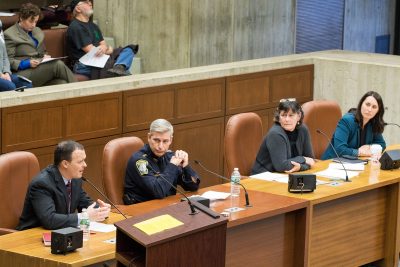
Approximately 30 Boston residents gathered at Boston City Hall on Monday afternoon to attend a public hearing about the Urban Areas Security Initiative, which helps urban areas prevent and recover from acts of terrorism.
The initiative is a federal grant of over $14 million that supports the “planning, exercises, training and operational needs” of the Mayor’s Office of Emergency Management, according to a committee hearing notice published by the Boston City Council on Nov. 21.
The grant has sparked public debate because of its controversial proposal to award $1.4 million to the Boston Police Department for the research and eventual implementation of new technology designed to scan public social media accounts for potential threats, according to BPD Superintendent in the Bureau of Intelligence and Analysis Paul Fitzgerald.
City Councilor Andrea Campbell presided over the hearing, and called for an orderly meeting where all residents’ voices could be heard.
“No city agencies agree on everything,” Campbell said during the hearing. “Sometimes we have to find compromises.”
The BPD put out a request for proposals for a new technology that would help them sift through social media posts to identify content that poses a credible threat to citizens’ security, according to Fitzgerald.
David Carabin, the director of the Boston Regional Intelligence Center, said during the hearing that such technology does not currently exist, but that the BRIC and BPD are researching surveillance technology that will best suit the city’s needs.
“Privacy really is the heart and soul of the BRIC operation,” Carabin said when he addressed some residents’ concerns about their privacy.
The proposed surveillance has attracted criticism from civil liberties organizations including the American Civil Liberties Union of Massachusetts, which said that automated surveillance of citizens’ social media accounts, will invade citizens’ privacy and hinder freedom of speech.
“The internet is awash with political commentary of all stripes, and the vast majority of people who express unpopular or even radical opinions will never hurt anyone,” the ACLU wrote in an official statement published on Monday and passed out at the hearing.
Fitzgerald said BPD would only search public social media accounts, except when a court warrant allowed them to override privacy settings.
“Technology cannot take the place of human information,” Fitzgerald said during the hearing.
Campbell was joined by several of her colleagues, including city councilors Ayanna Pressley, Tito Jackson and Josh Zakim.
Pressley said while she did not want to discredit the merit of BPD’s previous surveillance efforts, she found it difficult to reconcile some of the political implications of the grant.
“I’m struggling with, in this current political climate, how do we assuage the very legitimate anxieties around potential racial profiling alternatives?” Pressley said. “The word ‘threat’ is very subjective. There are people who are threatened by someone who is a Sikh, or someone who is wearing a Black Lives Matter T-shirt.”
Jackson formally requested that the City Council hold meetings with residents before implementing the grant.
“The overarching need and focus has to also be on our democracy and our constitution, and whether or not we are in any way overstepping,” Jackson said.
Zakim said he is concerned that files on residents’ social media activity would be kept for extended periods of time.
“Boston is the birthplace of American democracy,” Zakim said. “We have a great history of peaceful protest here, and I want to make sure that people can continue to do that.”
Fitzgerald responded that only criminal cases would be recorded, and all cases would be reviewed after 90 days.
After exhausting the City Councilors’ questions, Campbell opened the floor for Boston residents to give their testimony.
Taylor Campbell, 27, of Quincy, said it is easy to take social media comments out of context.
“In the public square, I don’t have a police officer standing behind me listening all the time … we do not have the ability to monitor everyone’s communication, because that would have a chilling effect,” Campbell said.
Kristina Nies, 35, of Cambridge, said she wanted to raise the issues of trust and community.
“We need a police force working to help and protect our [people],” Nies said. “We need to build trust so that no police officer sees the need to reach for a gun.”
Jessica Lowell, 31, of Belmont, offered her perspective on social media scanning technology, as a Ph.D candidate in computer science at Brandeis University.
“Two human analysts might know they’re subject to human error [but] these technologies do not do [surveillance] as well as humans,” Lowell said.


















































































































